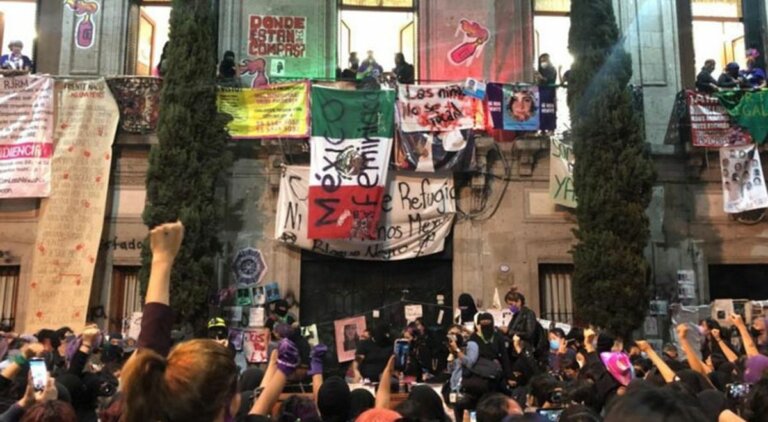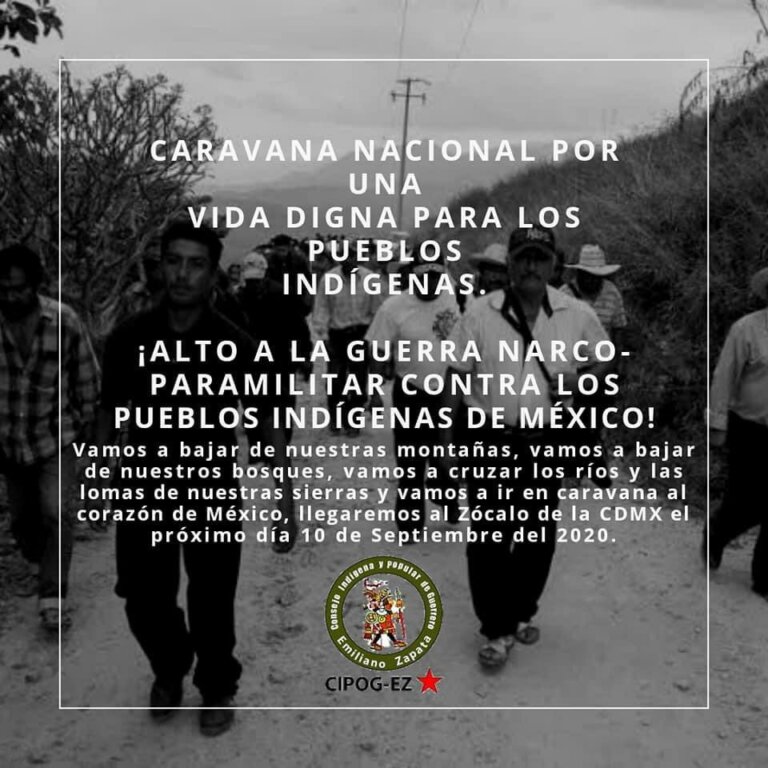November 2nd, 2007 – Jennifer Truskowski writes: On Thursday, October 25, in Washington, DC the Subcommittee on the Western Hemisphere held a hearing to discuss Plan Mexico, recently renamed the Merida Initiative in a PR attempt to distance this plan from the failed Plan Colombia. Plan Colombia is a similar “drug war” Washington military aid package which hasn’t reduced the availability of drugs in the U.S., barely reduced the production of cocaine in Colombia, and devastated poor farmers whose food crops have been destroyed and who never received sufficient alternative aid.
The Bush administration has still failed to make Plan Mexico details public to citizens or even the officials attending this hearing, which made the discussion almost pointless. Even the purpose of Plan Mexico was unclear. When Chairman Eliot Engel gave his opening speech he asked, “Is our goal to curb the amount of drugs entering the United States or is it to help Mexico and communities on the U.S.-Mexico border to improve their security?”
Plan Mexico is slated to pour $1.4 billion into military and police training, equipment such as helicopters, planes, and boats, and intelligence training and equipment for Mexico. The U.S. Bureau of International Narcotics and Law Enforcement Affairs estimates that about 90% of the cocaine consumed in the United States enters through Mexico. Assuming that the whole thrust of Plan Mexico is to curb the amount of drugs entering the United States, the speakers made quite a stunning revelation.
Chairman Eliot Engel stated, “We should not be so naïve as to think that the defeat of Mexico’s drug cartels alone will significantly reduce drug consumption in the United States. Drug traffickers can easily pick up once again and move on to new routes.” He explains that when major drug cartels in Colombia shut down, the business simply moved to Mexico where its drug transit capacity increased. He then says that the Merida Initiative will “merely steer the drug flows to the Caribbean, and particularly to Haiti.”
James R. Jones, Co-Chairman and CEO of Manatt Jones Global Strategies, explained that drug cartels are fairly new to Mexico. In the past, drugs were shipped through the Caribbean, but one of his colleagues “carried on a decade long battle to thwart drug trafficking through the Caribbean to the United States,” and then later the U.S. seriously disrupted another drug trafficking corridor through the Gulf of Mexico. “So the drug lords from South America merely changed their routes, using Mexican land routes as the avenue to the drug demand in our country.”
Later he says, “…as long as the U. S. market for illegal drugs was as large and prosperous as it was, the drug traffickers will find a way to penetrate that market.” He compares drug traffickers to cockroaches, who will always find a way into the market as long as there is demand, and who will never be completely eliminated.
Joy Olson, executive director of the Washington Office on Latin America (WOLA) says something awfully similar: “So long as the U.S. market for illicit drugs remains so large and lucrative, successful disruption of drug production and trafficking displaces trafficking operations and the devastation they entail to new areas… Congress should be asking, Who will be devastated by the drug trade next?”
She concludes with, “Apart from probable short-term disruptions in trafficking, there should be no expectation that this package will stem the flow of drugs into the United States.”
So basically the speakers at this hearing are all agreeing that this plan, assuming that it accomplishes all its goals, will only move the drug trade elsewhere. In essence, we would be spending $1.4 billion to plug one hole in the kitchen, while all the cockroaches later enter through the bathroom. Is this really the best plan that scores of educated government people can come up with to fight drug consumption in the U.S.?
One key point that was in WOLA’s report on violence and drug trafficking in Mexico was that drug treatment programs have proven to be far more effective at reducing drug consumption than fighting cartels in other countries. I have to wonder why we don’t just spend a fraction of that $1.4 billion to fund drug treatment facilities at home, thereby reducing the demand for drugs, which is the major factor that is driving all this trafficking and violence to begin with.
On that note, we would have to assume the main purpose of Plan Mexico is to help Mexico “improve its security.”
In the hearing, Chairman Engel used U.S. journalist Brad Will’s murder as an example of the kind of drug-related violence we must be fighting. In the fall of 2006, Brad Will was videotaping a conflict in Oaxaca that had begun months earlier when local police were sent by governor Ulises Ruiz to attack peaceful teachers gathered in the city square who were striking for better wages. From this event, a movement grew to overthrow the corrupt Ruiz. On the day that Brad Will was shot, local and federal police forces had been sent to attack protesters. He was shot in the conflict, and his camera recorded the moments of his own death. On the footage we see his alleged murderers. Photos of them were published in Mexican newspapers. They were two municipal police officers, two members of the local city hall, and the former justice of peace of a nearby town.
Since then, Mexican officials have not tried or punished any suspects for the murder of Brad Will. In fact, nobody has ever been tried or punished for any of the 26 murders that happened so far during the Oaxaca struggle. Brad Will’s murder is a perfect example of how abusive and corrupt the Mexican government is, and just one reason why we should not be handing law enforcement aid to Mexican officials. Engel’s blatantly ignorant mention of Will’s murder was irresponsible and offensive, and I can only hope that he is receiving piles of angry letters.
(If you would like to send one: Eliot L. Engel, Chairman, Subcommittee on the Western Hemisphere, phone: 202-225-2464, fax: 202-225-5513, email: jason.steinbaum (at) mail.house.gov)
Mr. Jones also demonstrated his ignorance by stating, “Let’s remember that Mexico has had real democracy for only about a dozen years.” He assumes that since a different political party is in power now, this signifies real democracy. In fact, the public, journalists, and experts widely believe President Calderón’s own election was fraudulent. And local elections still continue to be fraudulent as political parties pay people to vote, or buy them off with gifts. Then when citizens attempt to protest and change this system police and military are swiftly sent in to beat, arrest, and shoot people, as many have seen in the cases of Oaxaca and San Salvador Atenco.
This military, which Mr. Jones said “is still probably the most respected law enforcement institution in Mexico,” freely abuses Mexican citizens with impunity because its members can’t be tried in civilian courts for such abuses. Many of these abuses have been covered in hundreds of reports, but some are worth mentioning to contrast with comments that various U.S. officials have made admiring President Calderón’s “bold” fight against organized crime.
Earlier this year an elderly indigenous woman in Veracruz died of internal injuries after she told her family a group of Mexican soldiers beat and raped her. Even though sufficient evidence was found that she had been beaten and raped, and semen samples were supposedly sent to be tested, the Mexican Human Rights Commission, President Calderón, and the Mexican Defense Department all suddenly changed the official story, stating the woman was never raped or attacked, and that she died of natural causes.
Later a group of soldiers shot a family to death who were passing through a military checkpoint in Sinaloa. Some of the soldiers tested positive for cocaine and marijuana use. The Mexican government acknowledged that it was a mistake, then Mexico’s Interior Minister Francisco Ramirez Acuna arrogantly issued a statement that these tragedies are “the price we have to pay for our vigilance.”
So on top of Plan Mexico being a misguided waste of money to begin with, we would be funding an inept corrupt government that is aggressively abusing its own people. This was a point that all speakers failed to discuss, including Joy Olson who is supposed to have a specific focus on human rights concerns. And for a plan that is supposedly meant to improve Mexico’s security, this is a frightening oversight.
Instead the speakers in the hearing expressed either lukewarm support or beaming admiration for both Plan Mexico and President Calderón. Armand Peschard-Sverdup, Senior Associate for the Center for Strategic and International Studies, said in the hearing: “The U.S. Congress has a unique opportunity to support the bold leadership that President Calderón has exhibited in just his first 10 months in office and, more importantly, to reinforce the unprecedented level of cooperation between the United States and Mexico that this initiative is based on.”
This indicates that Plan Mexico is not concerned with either drugs or the security of its people. Instead it appears that it is concerned with giving Mexico resources to quell its social movements so that Mexico can happily continue to participate in U.S.-dominated free trade agreements that sell its resources to transnational corporations and push its own citizens further into poverty and desperation. One revealing aspect of the hearing is the fact that one guest speaker was a CEO from a company that provides marketing and development advice to international businesses (www.manattjones.com). In this case, these government officials need to call a spade a spade, admit to the U.S. citizens what this is really all about, and let the public judge whether this plan is a good idea.
Congress needs to hear from U.S. citizens. Plan Mexico is now being included in the supplementary spending bill for the wars in Iraq and Afghanistan, and the Bush administration is trying to pressure congress to pass it before the end of the year, even while it still refuses to release details about the plan. Instead congress is being spoonfed all kinds of pretty ideological phrases about unprecedented cooperation, noble security measures, and fighting evil drugs. They don’t hear about indigenous women getting raped to death or citizens and journalists getting shot by Mexican police without any recourse. They need to hear that from us.
One congressman who may like to hear from you is Harry Reid, the Democratic Senate Majority leader, who has threatened to halt passage of the supplementary bill that includes Plan Mexico. He needs to know we strongly support this effort.
Senator Harry Reid
528 Hart Senate Office Bldg
Washington, DC 20510
Phone: 202-224-3542
Fax: 202-224-7327
Also, harass your own senators. If you would like to use a sample letter, you can find one here:
http://chicago.indymedia.org/archive/newswire/display/79889/index.php
You can also feel free to use any paragraphs directly from this article.
Sources:
Esquivel, J. Jesús. “Amenazan demócratas con frenar fondos para el Plan Mérida.” 23 October 2007. Proceso.
Gonzalez, Juan. “One Year Later, Justice Eludes Killers of American Journalist Brad Will.” Interview with journalist John Ross. 26 October 2007. Democracy Now! http://www.democracynow.org/2007/10/26/one_year_later_justice_eludes_killers
Meyer, Maureen and Roger Atwood. “Reforming the Ranks: Drug-Related Violence and the Need for Police Reform in Mexico.” 29 June 2007. Report for the Washington Office on Latin America.
Ross, John. “From the Folks Who Brought You Plan Colombia: The Annexation of Mexico.” 18 June 2007. http://www.counterpunch.org/2007/06/18/the-annexation-of-mexico/
Subcommittee on the Western Hemisphere hearing transcript. 25 October 2007.
—
source: http://chicago.indymedia.org/


